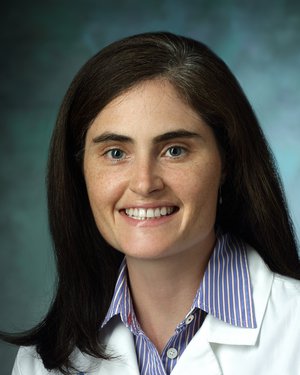
Christa Whelan Habela, MD, PhD
Pediatric Epilepsy Neurology
Pediatric Neurology
Neurology
Neuromuscular Medicine
Highlights
Johns Hopkins Affiliations:
- Johns Hopkins School of Medicine Faculty
About Christa Whelan Habela
Primary Academic Title
Assistant Professor of Neurology
Background
Dr. Habela completed a Medical Scientist Training Program at the University of Alabama, Birmingham. She received her PhD in Neurobiology in 2008 and her MD in 2010. After medical school, she specialized in child neurology, and completed 2 years of pediatrics residency and 3 years of child neurology residency at the Johns Hopkins Hospital in 2015. She then completed another 2 years of training specifically focused on the diagnosis, characterization and medical and surgical management of patients with epilepsy during an Epilepsy Fellowship at Johns Hopkins.
Dr. Habela’s clinic specializes in pediatric neurology and epilepsy. Her clinical focus in on the care of patients with severe epilepsy with or without other neurodevelopmental disorders that have not been easily controlled with medications. She is also focused on the genetic causes of epilepsy and other neurodevelopmental disabilities with the hope that increasing our understanding of the genetic causes of epilepsy and neurodevelopmental disabilities will improve treatment.
Dr. Habela’s basic science research is focused on the genetic mechanisms regulating appropriate proliferation, migration and integration of neurons and glial cells in both the prenatal and postnatal developing brain and how aberrations in these processes result in neurodevelopmental disabilities. Her hypothesis is that deregulation of pre and postnatal neurogenesis and synaptogenesis contributes to the behavioral phenotypes observed in many forms of intellectual disability, epilepsy and autism. Her research applies what we know from human genetic studies to basic science studies examining how specific genetic changes alter neurogenesis, synaptogenesis and overall excitation / inhibition balance in laboratory model systems. Her goal is to provide a better understanding of the molecular mechanisms of these processes and, in turn, possibly identify specific targets for disease modifying treatments for epilepsy.
Contact for Research Inquiries
600 N. Wolfe Street
Meyer 2-147
Baltimore, MD 21287
Phone: (410) 955-9100
Research Interests
Epilepsy, Genetics, Synaptogenesis, Neuronal Development
Research Summary
Dr. Habela’s basic science research is focused on the genetic mechanisms regulating appropriate proliferation, migration and integration of neurons and glial cells in both the prenatal and postnatal developing brain and how aberrations in these processes result in neurodevelopmental disabilities. Her hypothesis is that deregulation of pre and postnatal neurogenesis and synaptogenesis contributes to the behavioral phenotypes observed in many forms of intellectual disability, epilepsy and autism. Her research applies what we know from human genetic studies to basic science studies examining how specific genetic changes alter neurogenesis, synaptogenesis and overall excitation / inhibition balance in laboratory model systems. Her goal is to provide a better understanding of the molecular mechanisms of these processes and, in turn, possibly identify specific targets for disease modifying treatments for epilepsy.
Selected Publications
Cuddapah VA, Habela CW, Watkins S, Moore LS, Barclay TT, Sontheimer H. Kinase activation of ClC-3 accelerates cytoplasmic condensation during mitotic cell rounding. Am J Physiol Cell Physiol. 2012 Feb; 302(3):C527-38. Epub 2011 Nov 2. PMID: 22049206. PMCID: PMC3287156.
Ernest NJ, Habela CW, Sontheimer H. Cytoplasmic condensation is both necessary and sufficient to induce apoptotic cell death. J. Cell Sci. 2008 Feb 1; 121(Pt3):290-7. PMID: 18198188. PMC2561226.
Habela CW, Ernest NJ, Swindall AF, Sontheimer H. Chloride accumulation drives volume dynamics underlying cell proliferation and migration. J. Neurophysiol. 2009 Feb; 101(2):750-7. Epub 2008 Nov 26. PMID: 19036868. PMC2657062.
Habela CW, Olsen ML, and Sontheimer H. ClC3 is a critical regulator of the cell cycle in normal and malignant glial cells. J. Neurosci., Sep 2008; 28: 9205 - 9217.PMID: 18784301. PMC2593939.
Yoon KJ, Song G, Qian X, Pan J, Xu D, Rho HS, Kim NS, Habela C, Zheng L, Jacob F, Zhang F, Lee EM, Huang WK, Ringeling FR, Vissers C, Li C, Yuan L, Kang K, Kim S, Yeo J, Cheng Y, Liu S, Wen Z, Qin CF, Wu Q, Christian KM, Tang H, Jin P, Xu Z, Qian J, Zhu H, Song H, Ming GL. Zika-Virus-Encoded NS2A Disrupts Mammalian Cortical Neurogenesis by Degrading Adherens Junction Proteins. Cell Stem Cell. 2017 Aug 16.
Honors
- Child Neurology Career Development Award, 1/1/17
- Neurobiology of Disease in Children, Young Investigator, 1/1/15
- R25 Research Education Award, 1/1/14
Lectures & Presentations
- Chloride-mediated Volume Changes Are Required for Normal Glioma Cell Division, Invited Talk, Cell Volume Control, Salzburg, Austria, 9/1/07
- Genetics of Epilepsy: Furthering Our Understanding of Neural Development, Invited Talk, Pediatric Neurology Grand Rounds, Department of Neurology, Johns Hopkins Hospital, 6/22/16
Locations
- Johns Hopkins Outpatient Center
- 601 North Caroline Street, Floor 5, Baltimore, MD 21287
- phone: 410-955-4259
- fax: 410-367-2767
Expertise
Education
Johns Hopkins University School of Medicine
Fellowship, Epilepsy, 2017Johns Hopkins University School of Medicine
Residency, Neurology, 2015Johns Hopkins University School of Medicine
Residency, Pediatrics, 2012University of Alabama at Birmingham
Medical Education, MD, 2010University of Alabama at Birmingham
Graduate School, PhD, 2008Board Certifications
Epilepsy
American Board of Psychiatry and Neurology, 2017Neurology with Special Qualification in Child Neurology
American Board of Psychiatry and Neurology, 2015Insurance
- Aetna
- CareFirst
- Cigna
- First Health
- Geisinger Health Plan
- HealthSmart/Accel
- Humana
- Johns Hopkins Health Plans
- MultiPlan
- Pennsylvania's Preferred Health Networks (PPHN)
- Point Comfort Underwriters
- Private Healthcare Systems (PHCS)
- UnitedHealthcare
- Veteran Affairs Community Care Network (Optum-VACCN)
